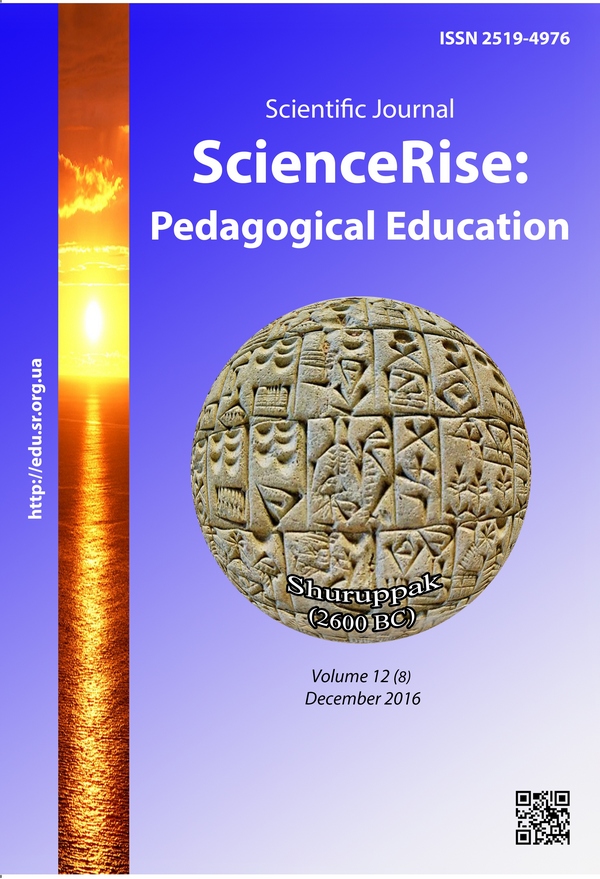The investigation of didactic aspects of developing students’ english speaking skills at higher art schools of Ukraine
DOI:
https://doi.org/10.15587/2519-4984.2016.88008Keywords:
communicative competence, communication, speaking, didactics, communicative method, art HEIAbstract
The didactic principles of training and development of another language speaking skills of the students of higher art school are analyzed in the article. The dependency between the changes of value orientations in society and content of teaching-professional themes was outlined, the relation between the notions “communication” and “intercourse” and their role in communicative interaction was indicated. The main aim of research is in the analysis of the features of didactic aspects to facilitate and accelerate the comprehension of language by students of the higher art schools. The author underlines that communication is an important condition in the process of formation and development of both society and person. At the same time communication is the base of consciousness, cognition and social interaction for the solution of actual problems of reality.
The series of didactic principles were separated: 1) improvement of teaching method by reorientation from pragmatic to communicative one; 2) modernization of the content of educational material; 3) guaranteeing of connection between teaching and extra-teaching activity in the process of speaking skills and abilities formation; 4) proper training of students for computer study and testing; 6) guaranteeing of integration of multicultural information with the main program material of professional academic disciplines.
The author makes the conclusion that the observance of didactic principles in the study improves the quality of mastering English language by students and favors their ability to communicateReferences
- Barabanova, G. V. (2005). Metodyka navchania profesijno-orijentovanogo chytania u nemovnomuVNZ. Kyiv: INKOS, 315.
- Zjazjun, І. A. (2001). Prіoritetnі principi didaktiki suchasnoi profesіjnoi osvіti. Naukovі pracі. Pedagogіchnі nauki, 13, 11–17.
- Reyzenkind, T. Y. (2001). Prioritetni principy didacticy sucasnoji profesijnoji osvity. Naukovyi Visnyk Mykolayivskogo dergavnogo pedagogichnogo Universytetu, 4, 11–22.
- Komenskyj, J. A., Lock, J., Rousseau, J.-J., Pestalotzzi, I. G. (1989). Velyka didactica. Moscow: Pedagogika, 416.
- Hymes, D.; Pride, J. B., Holmes, J. (Eds.) (1972). On Communicative Competence. Harmondsworth: Penguin, 269–293.
- Hutchinson, T., Waters, A., Stevens, P., Kennedy, Ch., Bolitho, R. (2016). An introduction to English for Specific Purposes. Available at: https://faclettre.univ-tlemcen.dz/assets/uploads/DOCUMENTS/cours%20en%20ligne/4-An%20Introduction%20to%20ESP%20LAMRI.pdf
- Morska, L. I. (2006). Theoretico-methodychni osnovy rozrobky ta zastosuvania compjuternogo pedagogichnogo testu. Ternopil: Aston, 160.
- Chechel, Ye. H., Chechel, N. P. (2011). English for higher education art institutions. Vinnitsa: Nova knyha, 456.
- Shpak, V. K. (2001). Anglijska mova dlia povsiakdennogo spilkuvannia. Kyiv: Vyshcha Shkola, 152.
- Metodologichni zasady lingvodidactyky. Available at: http://udnz15.org/metodologichni
- Goncharenko, S. U. (1997). Ukrajinskyj pedagogichnij slovnyk. Kyiv: Libіd, 376.
- Andrejev, V. I. (1996). Pedagogika tvorcheskogo samorazvitija. Innovatsionnyj kurs. Kazan: Izdat-vo Kazanskogo Un-ta, 556.
- Fitsula, M. M. (2000). Pedagogy. Kyiv: Publishing Center "Academy", 544.
- Nikolajev, S. U. (Ed.) (2003). Zagalnoyevropeiski Recomendatsiji z movnoji osvity: vyvchenia, vykladania, otsiniuvania. Kyiv: Lenvit, 273.
- Levytskyy, A. E., Naberezhnyeva, T. E., Povoroznyuk, R. V. et. al.; Levytskyy, A. E. (Ed.) (2013). Communicativni Strategiji. Kyiv: Vydav.-polihraf. tsentr "Kyiv University”, 559.
Downloads
Published
How to Cite
Issue
Section
License
Copyright (c) 2016 Мирослава Павлівна Костюк

This work is licensed under a Creative Commons Attribution 4.0 International License.
Our journal abides by the Creative Commons CC BY copyright rights and permissions for open access journals.
Authors, who are published in this journal, agree to the following conditions:
1. The authors reserve the right to authorship of the work and pass the first publication right of this work to the journal under the terms of a Creative Commons CC BY, which allows others to freely distribute the published research with the obligatory reference to the authors of the original work and the first publication of the work in this journal.
2. The authors have the right to conclude separate supplement agreements that relate to non-exclusive work distribution in the form in which it has been published by the journal (for example, to upload the work to the online storage of the journal or publish it as part of a monograph), provided that the reference to the first publication of the work in this journal is included.







